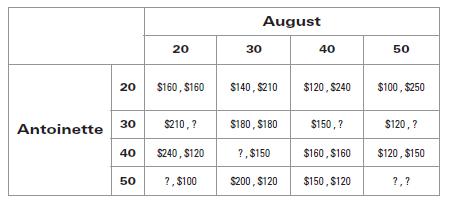15. In a dry, dusty desert town, only two people (Antoinette and August) have water wells. Each...
Question:
15. In a dry, dusty desert town, only two people (Antoinette and August) have water wells. Each day, they begin their morning by pumping water, which they then bring to the town square to sell. Pumping water costs them essentially nothing, but time is such that each can afford to make only one trip to the town center, which means that they must decide how much to pump at the start of each day.
The townsfolk’s demand for water is given in the table below:

Suppose for simplicity that Antoinette and August are limited to pumping either 20, 30, 40, or 50 gallons of water each.
a. Verify that the payoffs in the game table on the next page, which reflect the profits Antoinette and August earn, are accurate. Fill in any missing values. Remember that the market price is determined by total production, but that each producer’s profit is determined by how much each chooses to produce.

b. Suppose that Antoinette and August agree to collude and restrict their combined output to maximize their joint profits. They agree to divide production and profits equally. Referring to the payoff matrix above, how many gallons will they agree to produce in total? How many gallons of the total market supply will each supply? How much profit will each earn?
c. Does Antoinette have any incentive to cheat on this collusive arrangement? Does August? If so, how will such cheating manifest itself?
d. What is the Nash equilibrium in this game? Is the Nash equilibrium an ideal outcome for our two water producers?
e. How does the game Antoinette and August are playing resemble a prisoner’s dilemma game?
Step by Step Answer:

Microeconomics
ISBN: 9780716759751
1st Edition
Authors: Austan Goolsbee, Steven Levitt, Chad Syverson






